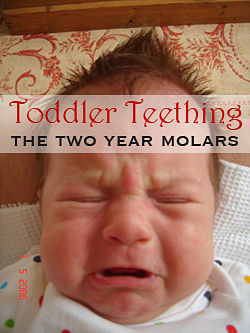 Our boys have been good sleepers since about five months of age, when the baby sleep training techniques we employed finally paid off. Suddenly just before their 2nd birthday, they started waking up at night, crying and near-inconsolable. Strangely, they both refused a pacifier. This is odd because they love their pacifiers — probably sensing that they’re going to be taken away soon — and normally won’t sleep without them. There were a few other strange things we’ve noticed:
Our boys have been good sleepers since about five months of age, when the baby sleep training techniques we employed finally paid off. Suddenly just before their 2nd birthday, they started waking up at night, crying and near-inconsolable. Strangely, they both refused a pacifier. This is odd because they love their pacifiers — probably sensing that they’re going to be taken away soon — and normally won’t sleep without them. There were a few other strange things we’ve noticed:
- Runny noses. These showed up right after we’d been outside and in public for a few days, so at first we worried about a cold.
- Slight fever. I noticed this when getting them up from a nap, and didn’t think much of it.
- Fussy wake-ups. Now that I think about it, we’ve noticed a few unexpected wake-ups in the middle of the night, though usually the boys go back to sleep on their own.
These are all classic symptoms of when a baby is teething, but they had all of their teeth already. Or so I thought! It turns out that children get their second molars between the ages of 20 and 33 months. These so-called two year molars are teething’s last chance to torment your little one.
Why Teething Causes Wake-Ups
Teething has always been the silent (or not-so-silent) menace when it comes to baby sleep training. It seems like whenever you finally get your baby sleeping for good stretches at night, he or she starts cutting another tooth and it’s back to square one. There are good reasons for this: teething is painful, it makes eating, drinking, and using the pacifier uncomfortable, and the reason it often disrupts sleep is that teeth grow at night. Nature’s diabolical when it comes to disrupting your baby’s sleep habits.
Help Your Teething Toddler
Last night, when our older boy woke up crying at around midnight, he was almost inconsolable. That’s how I knew it wasn’t a nightmare, because picking him up and soothing him had no effect. The pacifier was unwelcome, too. All he really wanted was to go back to sleep, so that’s what we did: laid him down gently, tucked his blankie in around him, and told him “night night.”
We thought about Baby Orajel, a topical ointment that saved us countless times when the babies were teething, but abstained. I’ve read that teething gel should be avoided at this age, because toddlers can gnaw at the numbed area enough to create a sore. Instead, there are a number of other things to try:
- A warm, wet washcloth. A cold one works too; you can even stick them in the freezer for 20 minutes.
- A pacifier that you’ve run under cold, cold water
- Classic frozen or refrigerated chew teethers
- Frozen waffles, which are soothing to gnaw at and also help fill little bellies.
The only good news is that, once this passes, your little ones won’t face the problem until their adult teeth start coming in. And then all you have to worry about is the tooth fairy.